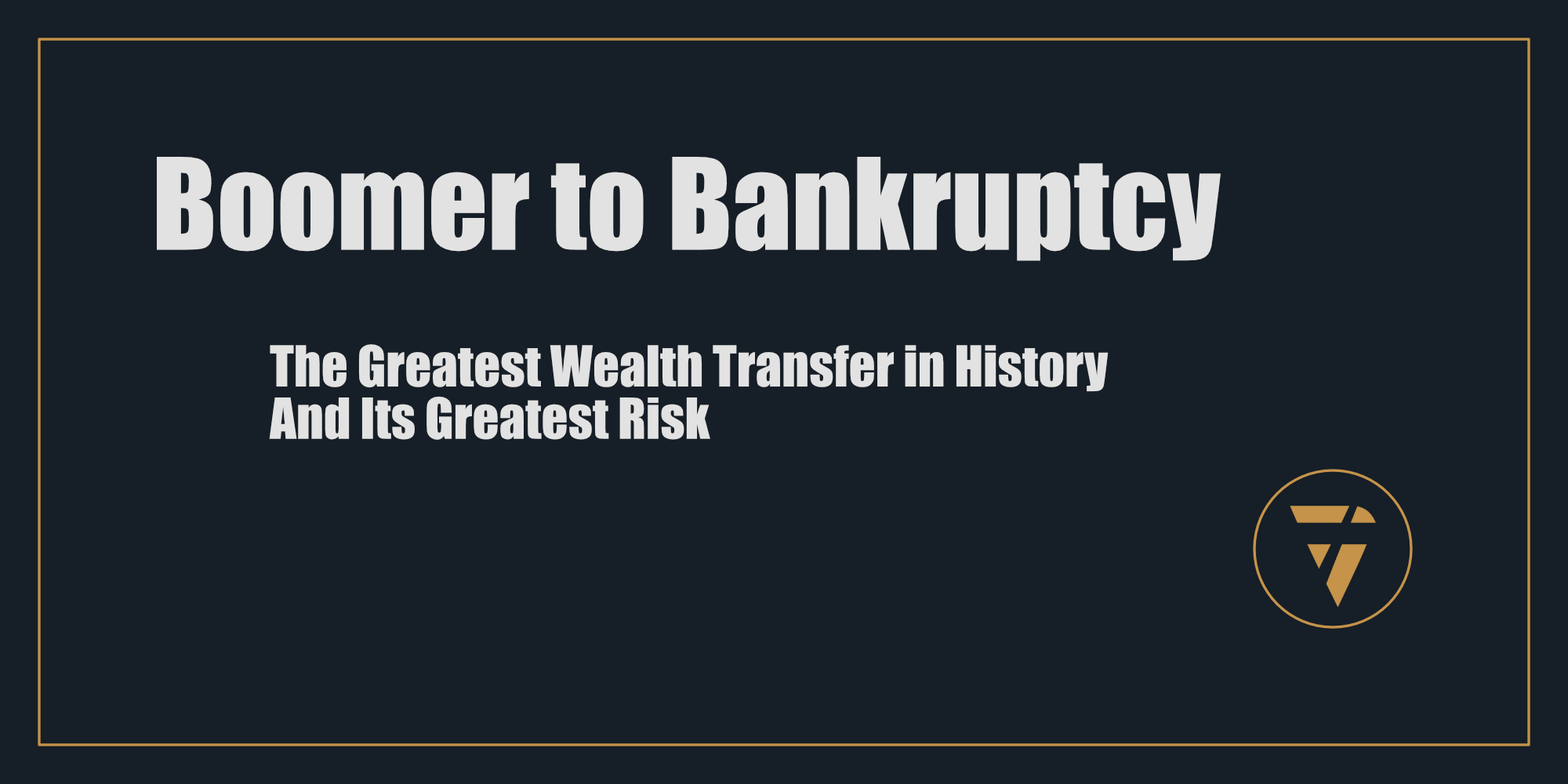Boomer to Bankruptcy

The Greatest Wealth Transfer in History—And Its Greatest Risk
Over the next two decades, Canada will experience the largest intergenerational wealth transfer in history. An estimated $1 trillion to $3 trillion will move from aging baby boomers to their heirs. On paper, this should create an unprecedented rise in generational financial security.
But history tells a different story.
70% of inherited wealth is gone by the second generation. 90% is lost by the third.
This isn’t speculation—it’s a pattern that has repeated itself for centuries. Family fortunes dissolve, businesses collapse, and once-affluent heirs fall into financial ruin. Why? Because wealth is not just about money. It’s about mindset, knowledge, and structure.
Boomers built their wealth through work, discipline, and long-term investment strategies. Their children and grandchildren, however, are inheriting money without the skills to sustain it. The result? A coming wave of mismanagement, financial collapse, and lost opportunity.
This is how fortunes disappear.
1. The Inheritance Paradox: Why Easy Money Is Dangerous
Wealth that is earned and wealth that is inherited do not function the same way.
When wealth is earned, the person understands its value—they have lived through the risks, sacrifices, and strategies that built it. When wealth is inherited, it arrives without context—there is no direct experience of the effort required to create or maintain it.
This is why sudden wealth is one of the most mismanaged financial windfalls. We see it in:
- Lottery winners—where 70% go broke within five years.
- Athletes and celebrities—where millions are lost to bad investments and reckless spending.
- Family inheritance cases—where wealth vanishes within two generations.
Money without stewardship is a liability, not an asset.
Key Factors Behind Inheritance Mismanagement:
- No Financial Literacy – Many heirs don’t understand how wealth works, leading to poor investment and spending decisions.
- Overestimation of Wealth Longevity – A multi-million dollar inheritance feels like endless money, but without structure, it can disappear fast.
- Lifestyle Inflation – Many heirs immediately increase their spending, buying luxury goods, real estate, and status symbols without considering sustainability.
- Asset Liquidation at the Wrong Time – Instead of managing inherited businesses or property, many heirs sell at market lows, burning generational wealth.
- Poor Investment Decisions – The rise of speculative investing (crypto, NFTs, day trading) has led many to gamble away inheritance in high-risk, low-reward ventures.
Without financial structure and discipline, wealth is not a security blanket—it’s a countdown clock to bankruptcy.
2. How Boomers Built—and How Their Heirs Will Destroy
Boomers, particularly in Canada, amassed wealth through four key channels:
- Real Estate – Boomers bought homes when prices were low, benefiting from massive appreciation. Many own multiple properties.
- Stable Pensions & Investments – They had access to company pensions, conservative investment portfolios, and low-cost stock markets.
- Business Ownership – Many boomers built small and mid-sized businesses, which became their primary wealth vehicles.
- Frugality & Long-Term Planning – Most boomers saved aggressively, avoided debt, and lived below their means.
Their children and grandchildren, however, operate in a completely different financial landscape:
- Real estate is nearly unaffordable for first-time buyers.
- Pensions are disappearing—most younger generations rely on RRSPs and TFSAs with inconsistent contributions.
- Debt is normalized—millennials and Gen Z carry record levels of student loans and consumer debt.
- Work stability is eroding—gig work, remote jobs, and automation make long-term financial planning harder.
When these financial realities meet a massive, poorly managed inheritance, the outcome is predictable: rapid wealth erosion.
3. The Business Succession Crisis: Where Most Wealth Will Disappear
One of the most overlooked dangers of the coming wealth transfer is the collapse of boomer-owned businesses.
- Over 60% of small and mid-sized businesses in Canada are owned by people over 55.
- Only 30% of family businesses survive past the second generation.
- Only 12% make it to the third generation.
Most boomers spent decades building businesses that generated wealth. Their heirs? Many are not interested, not prepared, or outright unwilling to take over.
This means that tens of thousands of businesses will either shut down or be sold at a loss, shifting economic power from families to corporations and private equity firms.
Three Ways Business Wealth Gets Wasted:
- Heirs Refuse to Take Over – The business is sold below value, liquidated, or left to decline.
- Heirs Mismanage Operations – Lack of business experience leads to bad decisions, poor hiring, and cash flow collapse.
- Businesses Are Acquired by Corporations – The wealth once built for the family is absorbed by larger companies, removing intergenerational economic power.
The tragedy? Most of these businesses are highly profitable—but without proper succession planning, they will simply vanish.
4. The False Security of Real Estate Wealth
Many heirs believe that inheriting property means financial stability. This is a dangerous misconception.
Common Real Estate Mistakes That Destroy Wealth:
- Selling Too Soon: Heirs panic-sell inherited homes rather than leveraging them for rental income or long-term value.
- Failing to Maintain Property: Many do not understand the ongoing tax, upkeep, and management costs of holding property.
- Overestimating Liquidity: A house is not the same as cash. Selling at the wrong time, in a down market, can lead to financial loss rather than gain.
- Inheriting Joint Ownership Disputes: Siblings fighting over an inherited home often end up in legal battles that erode both wealth and family relationships.
Real estate can be a powerful asset, but only if it’s managed with long-term thinking.
5. How to Prevent the Coming Wealth Collapse
The inheritance crisis is not inevitable. But it requires preparation, structure, and discipline.
Essential Strategies for Preserving Wealth:
✅ Financial Education for Heirs – Teach wealth management before inheritance is transferred.
✅ Business Succession Planning – If heirs won’t take over, sell strategically—not in panic.
✅ Investment Strategy Overhaul – Move wealth into long-term, diversified investment portfolios.
✅ Estate Structuring – Use trusts, staggered payouts, and structured wealth transfers to avoid lump-sum inheritance mistakes. I use a family trust for my kids.
✅ Financial Advisors & Legacy Planning – Professional management is not a luxury—it’s a necessity for wealth preservation.
The only families who successfully maintain wealth for multiple generations are those that treat inheritance as an asset, not a windfall.
Who Will Keep the Money?
This isn’t just a story about money—it’s a story about what happens when wealth moves without wisdom.
Boomers spent decades building. Their heirs now have two choices:
- Steward that wealth into the future.
- Squander it and return to financial uncertainty.
Most will lose it.
A few will understand that generational wealth is not about inheritance—it’s about responsibility.
Which side will you be on?
This is what I’m working on. Tell me what you think, I enjoy the conversation! Subscribe and follow the work in real time.
Thanks!
B

Boomers built it. Their kids will inherit it. Most will lose it.
Businesses sold in panic. Real estate liquidated at the wrong time. Inheritance spent, not invested.
$3T is changing hands. Who will keep it?
PS -






